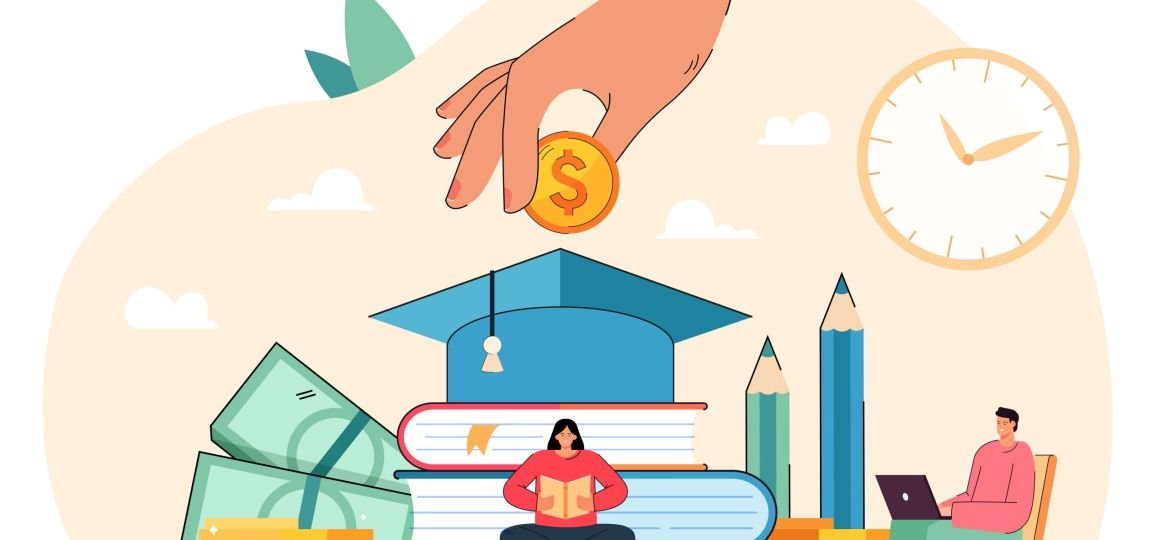
Graduating from college is an exciting milestone, but for many, the joy is tempered by the burden of student loan debt. Whether you’re just starting to repay your loans or have been chipping away at them for years, the goal of becoming debt-free can feel daunting. However, with the right strategy and commitment, it is possible to pay off your student loans faster than the standard repayment timeline.
In this comprehensive guide, we’ll explore practical tips and proven methods to help you accelerate the repayment of your student loans. From maximizing your income and cutting expenses to leveraging repayment assistance programs, you’ll discover a range of effective approaches to become debt-free sooner. Whether you’re tackling federal or private student loans, this article will provide you with the knowledge and tools to take control of your financial future and achieve your debt-free goals.
Understanding Your Student Loan Debt
Before you can develop a strategy to pay off your student loans faster, it’s essential to have a clear understanding of your current debt situation. Start by gathering all the relevant information about your loans, including:
- Loan Types: Determine whether you have federal student loans, private student loans, or a combination of both. This will help you identify the different repayment options and benefits available to you.
- Loan Balances: Compile a list of all your outstanding student loan balances, including the current principal amount, interest rates, and monthly payments for each loan.
- Repayment Terms: Familiarize yourself with the standard repayment timeline for your loans, typically 10 to 25 years, depending on the type of loan and repayment plan.
- Current Repayment Plan: Understand the details of your current repayment plan, such as the monthly payment amount, interest rate, and any potential for loan forgiveness or income-driven repayment options.
By gathering this information, you’ll be better equipped to develop a personalized strategy to pay off your student loans more quickly.
Strategies to Pay Off Student Loans Faster
Now that you have a clear understanding of your student loan debt, let’s explore the various strategies you can implement to accelerate the repayment process.
1. Increase Your Income
One of the most effective ways to pay off your student loans faster is to increase your income. Consider the following options:
a. Pursue a Higher-Paying Job: Look for opportunities to advance in your current career or explore new job prospects that offer higher salaries. This additional income can be allocated directly towards your student loan payments.
b. Take on a Side Hustle: Leverage your skills and interests to earn extra income through freelance work, consulting, or starting a small business. The extra earnings can be dedicated to accelerating your loan repayment.
c. Ask for a Raise: If you’ve been performing well in your current role, consider negotiating a salary increase with your employer. Any additional income can be put towards your student loans.
d. Explore Loan Forgiveness Programs: Investigate if you’re eligible for any federal or state-based student loan forgiveness programs, such as Public Service Loan Forgiveness (PSLF) or Teacher Loan Forgiveness. These programs can potentially eliminate a portion of your outstanding debt.
2. Reduce Your Expenses
Another effective strategy to pay off student loans faster is to cut down on your expenses. This will free up more funds to allocate towards your loan payments. Consider the following cost-saving measures:
a. Create a Detailed Budget: Carefully track your monthly expenses and identify areas where you can cut back, such as dining out, entertainment, or unnecessary subscriptions.
b. Reduce Housing Costs: If feasible, consider moving to a more affordable living situation, such as getting a roommate or downsizing your living space.
c. Optimize Transportation Costs: Explore alternatives to owning a car, such as public transportation, carpooling, or using a bike. This can lead to significant savings on gas, insurance, and maintenance costs.
d. Limit Discretionary Spending: Carefully evaluate your spending habits and look for opportunities to reduce discretionary expenses, such as shopping, hobbies, or travel.
e. Refinance Your Loans: If you have private student loans, consider refinancing to take advantage of lower interest rates. This can reduce the overall cost of your loans and allow you to pay them off faster.
3. Prioritize Loan Payments
When it comes to paying off student loans faster, it’s essential to have a clear repayment strategy. Consider the following tactics:
a. Make Extra Payments: Whenever possible, make additional payments towards your student loans, even if it’s a small amount. This will help you pay off the principal faster and reduce the overall interest you’ll pay over the life of the loan.
b. Target High-Interest Loans: If you have multiple student loans with varying interest rates, focus on paying off the loans with the highest interest rates first. This will save you the most money in the long run.
c. Utilize Lump-Sum Payments: If you receive a bonus, tax refund, or other lump-sum of money, consider applying it directly towards your student loan balance to make a significant dent in your debt.
d. Enroll in Automatic Payments: Many lenders offer a small interest rate reduction (typically 0.25%) for enrolling in automatic payments. This can add up over time and help you pay off your loans faster.
e. Explore Income-Driven Repayment Plans: If you’re struggling to make your monthly payments, investigate income-driven repayment plans offered by the federal government. These plans can lower your monthly payments based on your income and family size, potentially freeing up funds to allocate towards additional loan payments.
4. Leverage Employer Assistance
Some employers offer student loan repayment assistance as a benefit to their employees. Investigate whether your current or prospective employer provides any of the following programs:
a. Employer Contributions: Some companies directly contribute towards their employees’ student loan payments, either as a flat amount or a percentage of the monthly payment.
b. Student Loan Refinancing: Certain employers partner with lenders to offer student loan refinancing options with competitive interest rates and terms.
c. Tuition Reimbursement: If you’re pursuing further education or professional development, check if your employer offers tuition reimbursement or assistance programs that can help offset the cost of your student loans.
By taking advantage of these employer-sponsored benefits, you can potentially accelerate your student loan repayment and reduce the overall cost of your debt.
5. Explore Loan Forgiveness and Repayment Assistance Programs
Depending on your career, location, and other factors, you may be eligible for student loan forgiveness or repayment assistance programs that can significantly reduce your debt burden. Some of the most common options include:
a. Public Service Loan Forgiveness (PSLF): This federal program forgives the remaining balance of your federal student loans if you work full-time for a qualifying public service or non-profit organization and make 120 eligible monthly payments.
b. Teacher Loan Forgiveness: Eligible teachers who work full-time in low-income schools or educational service agencies for at least five consecutive years may qualify for up to $17,500 in federal student loan forgiveness.
c. State-Based Repayment Assistance Programs: Many states offer student loan repayment assistance programs for professionals in certain fields, such as healthcare, education, or public service. These programs can provide direct financial assistance or tax credits to help you pay off your loans.
d. Military and Veterans Benefits: Active-duty military members and veterans may be eligible for various student loan repayment and forgiveness programs, including the Servicemembers Civil Relief Act (SCRA) and the Department of Veterans Affairs (VA) Education Benefits.
Be sure to research and explore all the potential loan forgiveness and repayment assistance options that may be available to you based on your career, location, and personal circumstances.
Staying Motivated and Maintaining Momentum
Paying off student loans can be a long and challenging journey, but it’s essential to stay motivated and maintain momentum throughout the process. Here are some tips to help you stay on track:
- Celebrate Small Victories: Acknowledge and celebrate each milestone you achieve, whether it’s paying off a loan or reaching a specific savings goal. This will help you stay inspired and focused on your ultimate debt-free goal.
- Visualize Your Debt-Free Future: Regularly imagine what your life will be like once you’re free from student loan debt. This can provide the motivation you need to keep making progress.
- Automate Your Payments: Set up automatic payments to ensure that your student loan payments are made on time and without fail. This will help you maintain consistency and avoid missed or late payments.
- Seek Support and Accountability: Enlist the help of friends, family, or personal finance communities to hold you accountable and provide encouragement throughout your debt repayment journey.
- Reward Yourself Responsibly: As you make progress, allow yourself to enjoy small, thoughtful rewards that don’t derail your financial goals, such as a special outing or a treat you’ve been wanting.
Remember, paying off student loans faster is a marathon, not a sprint. By staying focused, disciplined, and motivated, you can steadily chip away at your debt and achieve financial freedom sooner than you might have thought possible.
Share Your Expertise, Build Your Business. Tired of limitations?
Create & sell online courses with Teachable. Keep 100% control. Start your free trial!
Conclusion
Paying off student loans can be a daunting task, but with the right strategies and a determined mindset, it is possible to accelerate the repayment process and become debt-free sooner. By increasing your income, reducing your expenses, prioritizing loan payments, leveraging employer assistance, and exploring loan forgiveness programs, you can take control of your student loan debt and achieve your financial goals.
Remember, every extra payment you make and every cost-saving measure you implement will bring you one step closer to financial freedom. Stay motivated, celebrate your progress, and continue to explore new ways to pay off your student loans faster. With dedication and perseverance, you can break free from the burden of student loan debt and pave the way for a brighter financial future.
Ready to take control of your finances? Visit upgrade.com now to explore a range of financial products, including Personal Loans, Auto Refinance Loans, Home Improvement Loans, Personal Credit Lines, and Upgrade Card. Let Upgrade help you achieve your financial goals today!


















